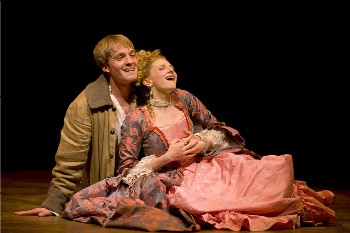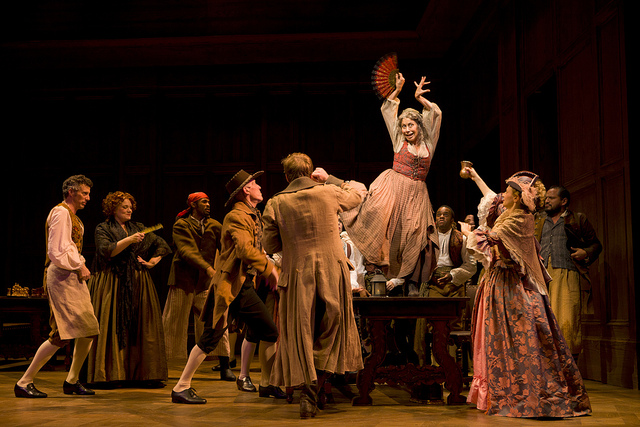Theater Review: A Fabulous “Candide”
In this delightful production of Candide, director Mary Zimmerman imaginatively reworks and mischievously augments the musical. Her deliciously blowzy approach embraces, with charming lyrical fervor, the sheer preposterousness of Voltaire’s sardonic fable.
Candide. Adapted from the book by Voltaire by Hugh Wheeler and Mary Zimmerman. Music by Leonard Bernstein. Lyrics by Richard Wilbur. Additional lyrics by Stephen Sondheim, John Latouche, Lillian Hellman, Dorothy Parker, and Bernstein. Directed by Zimmerman. Staged by the Huntington Theatre Company at the Boston University Theater, Boston, MA, through October 16.
By Bill Marx

Geoff Packard (Candide) and Lauren Molina (Cundegonde) in the Huntington Theatre Company's CANDIDE. Photo: T Charles Erickson
“A happy people in a happy world—/ Buffo! A ball, an opera, a bar” gushes Wallace Stevens, ironically, about the best of all possible worlds in his poem “The Auroras of Autumn.” The poet doesn’t include a musical theater celebration on the list, but in 1956 Voltaire’s acidic satire was served up on Broadway, with gloriously impish music by Leonard Bernstein, silky sleek lyrics by Richard Wilbur (supplemented by Dorothy Parker and John Latouche), a book by Lillian Hellman described by many critics as humorless, and a Tyrone Guthrie staging that was heavy-handed to the max. The show failed, perhaps because a fable that Voltaire described as “a schoolboy jest” was treated with a wooden earnestness.
In the delightful production of Candide at the Huntington Theatre Company (HTC), director Mary Zimmerman doesn’t make that mistake, imaginatively reworking and mischievously augmenting a version of Candide from the 1970s, with a book by Hugh Wheeler and additional lyrics by Stephen Sondheim. She is smart enough of a schoolgirl to realize that it is impossible to capture on stage the dark snap of the Enlightenment fable—her deliciously blowzy approach embraces, with charming lyrical fervor, the sheer preposterousness of the story, reveling in the yarn’s boisterous anticipations of the theater of the absurd and the heightened hysterics of camp. In other words, this exhilarating version of Candide, superbly sung and acted, combines all of Stevens’s instruments for making “Buffo!”—ball, opera, and bar, with smatterings of vaudeville, burlesque, and puppet show along the way.
The key to this production is its theatrical playfulness: antic, comic clowning in the face of the universe’s homicidal randomness serves as the apt response to Dr. Pangloss’s “métaphysico-théologo-cosmolonigologie” belief that everything happens for the best. Thus it makes perfect sense that the performers, not Voltaire, are the narrators of the proceedings and that Candide’s adventures in reality, once the low-born lad is flung from the presence of his first and everlasting love, the aristocratic Cunegonde, are treated with a childlike gusto, a paradoxical vision of invigorating, knockabout disaster.
In the memorable opening scenes, operetta slips on a banana peel, landing the exiled Candide in an empty room that morphs into Zimmerman’s impressionist playground: war becomes balls thrown across the stage, characters are stabbed in slow-mo, the Lisbon earthquake is dramatized as building blocks tumbling off a tray, sea voyages are punctuated by seagulls and ships waved about on long sticks, the geography of Candide’s wanderings from the Old World to the New is filled with images of giant dragons swimming in the deeps, overgrown insects and plants, cute little red sheep, and hand-held ocean waves.
The colorful caricatures, including a farcical auto-da-fé and a miniature balloon trip out of paradise, reflect the gaudy innocence of Candide’s view of the world. These delusive dreams must end before the modest blooms of disillusionment in his garden can grow, the latter a place where real feelings and facts—economic, biological, and otherwise—can be faced. Voltaire’s shocking cartoon accepts meaninglessness; in Zimmerman’s hands, Candide grows into maturity.
The fluidity of the staging, the sense that anything could pop up, adds to the evening’s pleasurable manipulation of surprise. The final gasp comes from how, despite its determined silliness, this Candide becomes genuinely moving by the end. Yes, the final scene jettisons Voltaire’s sly hint that he may be pulling the reader’s leg, but it carries a powerful emotional punch nonetheless, generated by the cast’s stirring a cappella rendition of the final tune, “Make Our Garden Grow.” The song’s cry for empathy escapes the schmaltzy.
The HTC cast brings to Zimmerman’s lyrical world of make-believe expertly modulated energy, an admirable talent for comic detail (each role, even the smallest, is given an individuating detail or two), and ace warbling. Larry Yando’s Pangloss comes off as a charismatic, stiff-necked optimist, exuding the air of a con man who just won’t admit that his philosophical scam is over, while Geoff Packard’s Candide moves with ease from the unbelievably gullible to the suitably chastened. Erik Lochtefeld also scores as Maximilian, an irredeemably over-the-top fop.
Lauren Molina brings operatic panache and funny, flirty timing to Cunegonde, her number “Glitter and Be Gay” one of the standouts of the evening, a miraculous collision of shame and self-admiration that makes for razor-sharp black comedy. Favorite tunes include Martin’s ”Words, Words, Words,” a Beckettesque ditty about the “worst of all possible worlds” that Tom Aulino accents with existential, cracked laughter, and the high-stepping Spanish dance number “I Am Easily Assimilated,” with Cheryl Stern, as the Old Lady, bringing plenty of hammy dexterity to the number’s physical comedy. The orchestra, conducted by Doug Peck, plays with verve throughout.
There’s not much to complain about in this entertaining Candide. Sometimes the japes decline into the juvenile, and Daniel Pelzig’s choreography becomes a touch awkward around the edges. I adored the appearance of the trio of carping critics, snobs heaping hateful abuse on a play that Candide is enjoying, though the scene should be balanced with the much more populous category of Panglossian stage critics (in Boston and elsewhere) for whom it is always the best of all possible theater worlds. But it is very hard not to turn into an unreasonable optimist when presented with a production of Candide this intelligent and enjoyable.


I totally agree with your review, Bill–and would add that the costumes were amazing, and that the cast did an incredible job morphing into different characters (all but the two leads, I think, played multiple roles) and in and out of all the fabulous costumes and sets. I know the show has already been done in DC and Chicago (where it originated?), but I think it would be a smash on Broadway. I wonder if there are plans for that.